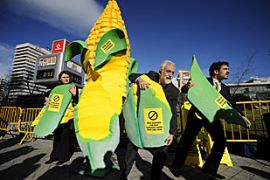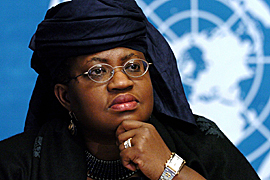UN urges action on food prices
World body says global credit crunch must not cause countries to ignore hunger crisis.

He said he hoped that the meeting would “bring concrete results in creating a global partnership” against hunger in developing nations.
“If governments can spend so much money to fix the financial crisis they should also have adequate fund to help the poorest people in the world,” he said.
‘Crippling shortages’
Diouf said that while cereal production had increased in 2008, the rise was mostly in developed nations.
A combination of factors including poor harvests, changing diets in emerging economies such as China and India, and an increase in demand for food crops to make biofuel have worked together to trigger sudden rises in prices for food staples.
Earlier, Ban Ki-moon, the UN secretary general and Jose Luis Rodriguez Zapatero, Spain’s prime minister, called for international involvement to help tackle food prices.
Ban and Zapatero, who will preside over the closure of the conference in Madrid, which involves representatives from 95 countries, said there was a “thin line between plentiful food at low prices and crippling shortages, even famine”.
Speaking from the summit, Hillary Clinton, US secretary of state, said her country was “committed” to the goal of halving the number of people worldwide living in poverty and hunger by 2015.
“Food insecurity and high food prices pose a threat to the prosperity and security of many developing countries,” she said.
 |
| Okonjo-Iweala said we ‘must ensure those who are vulnerable get… assistance’ [EPA] |
Ngozi Okonjo-Iweala, the managing director of the World Bank, who is also leading a delegation to the meeting, said more resources were needed to help those suffering from rising costs.
She said: “Food prices are now volatile and that factor, combined with the impact of the financial crisis, only serves to heighten the challenges confronting the developing world.
“We expect high price volatility to continue and it will hit the poorest the most, as they spend half their income on food.
“More needs to be done as we must ensure those who are vulnerable get the assistance they need.”
‘Back to basics’
The global food crisis, which has sparked social unrest in several countries, threatens to push millions more people into hunger.
Around one sixth of the world’s population, nearly one billion people, suffer from malnutrion, with the vast majority in developing nations, the FAO says.
Ban and Zapatero said that they hoped that the meeting in the Spanish capital would move forward plans to reduce hunger and improve food security.
In a joint statement, they said: “A time of economic hardship is a time to get back to basics. And no human need or economic fulcrum is as basic as the right to eat.”
Okonjo-Iweala said although food prices have fallen they are still higher than they were three years ago.
The World Bank managing director said in some countries prices have not fallen as sharply as in others.
She said in Kenya maize prices had fallen by only one per cent in the last quarter, despite international prices dropping 32 per cent.
The World Bank expects to double its funding to poor countries hit the hardest by the food crisis, with $700 million in the pipeline from an emergency food fund, she said.